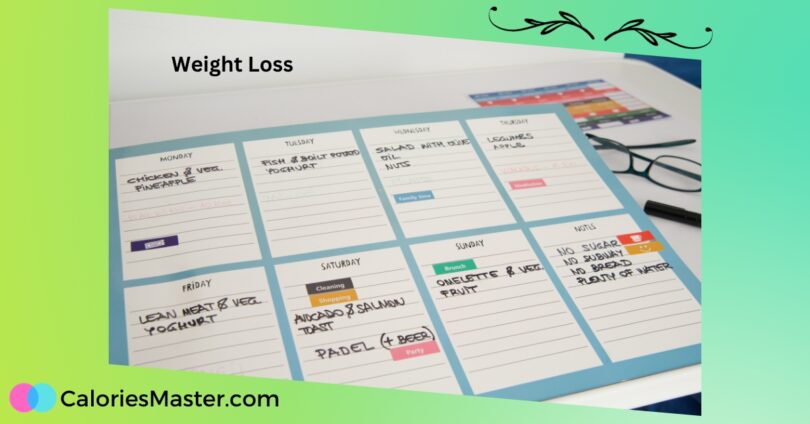Losing weight can be a challenging process, but a healthy diet is an essential component of any weight loss plan. Creating a diet schedule that promotes weight loss can be overwhelming, but it doesn’t have to be.
With the right information and guidance, you can create a diet schedule that works for you and helps you achieve your weight loss goals.
When it comes to weight loss, there’s no one-size-fits-all approach. Everyone’s body is different, and what works for one person may not work for another.
However, some general principles can help guide you in creating a diet schedule that promotes weight loss. In this article, we’ll explore some of these principles and provide tips for creating a diet schedule that can help you lose weight healthily and sustainably.
Understanding Weight Loss
Losing weight is a common goal for many people, but it can be a challenging process. To achieve weight loss, it’s important to understand the science behind it.
Calories In vs. Calories Out
The fundamental principle of weight loss is the concept of “calories in, calories out.” This means that to lose weight, you must consume fewer calories than you burn. When you consume fewer calories than your body needs, it will start to burn stored fat for energy, resulting in weight loss.
The Role of Macronutrients
Macronutrients, such as carbohydrates, proteins, and fats, play a crucial role in weight loss. A balanced diet that is low in calories and high in protein and fibre can help you feel full and satisfied while also promoting weight loss.
The Importance of Exercise
Exercise is an essential component of any weight loss plan. It can help you burn calories and build muscle, which can boost your metabolism and help you maintain weight loss in the long term.
Sustainable Weight Loss
While rapid weight loss may be tempting, it’s important to focus on sustainable weight loss. This means making lifestyle changes that you can maintain over time, such as eating a healthy diet and exercising regularly.
In conclusion, weight loss is possible by creating a calorie deficit through a balanced diet and regular exercise. Sustainable weight loss is achieved by making long-term lifestyle changes.
Diet Basics for Weight Loss
Calorie Deficit
To lose weight, you need to consume fewer calories than you burn. This is known as a calorie deficit. A calorie deficit of 500 to 1,000 calories per day can lead to a weight loss of 1 to 2 pounds per week.
However, it is important to note that extreme calorie restriction can be harmful to your health and slow down your metabolism.
To create a calorie deficit, you can either reduce your calorie intake or increase your physical activity. It is recommended to do both for the best results. You can use a calorie tracking app or consult a registered dietitian to determine your daily calorie needs and create a meal plan that fits your goals.
Macronutrients
Macronutrients are the three main nutrients that provide energy to your body: carbohydrates, protein, and fat. Each macronutrient has a different effect on your body and can play a role in weight loss.
Carbohydrates are your body’s main source of energy and can be found in foods such as fruits, vegetables, grains, and legumes. It is recommended to choose complex carbohydrates that are high in fibre and low in sugar to keep you feeling full and satisfied.
Protein is essential for building and repairing muscle tissue and can be found in foods such as meat, fish, eggs, and dairy. Protein can also help you feel full and reduce cravings.
Fat is important for hormone production and absorption of certain vitamins. However, it is also high in calories, so it is important to choose healthy fats such as those found in nuts, seeds, and avocado in moderation.
It is recommended to aim for a balanced diet that includes all three macronutrients in the right proportions for your body. A registered dietitian can help you create a meal plan that fits your goals and preferences.
Creating a Diet Schedule
When it comes to losing weight, a healthy diet is essential. Creating a diet schedule can help you stay on track and achieve your weight loss goals. Here are some tips on how to create a diet schedule that works for you.
Meal Timing
One important aspect of a diet schedule is meal timing. Eating at regular intervals can help keep your metabolism active and prevent overeating. Aim to eat three meals a day, with snacks in between if needed. Try to eat your meals at the same time each day to establish a routine.
Portion Control
Another key factor in weight loss is portion control. Eating too much, even healthy foods, can lead to weight gain. Use smaller plates and bowls to help control your portions. Aim to fill half your plate with vegetables, a quarter with protein, and a quarter with carbohydrates.
When creating your diet schedule, keep in mind that it should be sustainable and realistic. Don’t restrict yourself too much or cut out entire food groups, as this can lead to binge eating and an unhealthy relationship with food. Instead, focus on making healthy choices and finding a balance that works for you.
By following these tips and creating a diet schedule tailored to your needs, you can achieve your weight loss goals and improve your overall health.
Sample Diet Plan
Here is a sample diet plan for weight loss. This plan is just an example and can be adjusted to fit your specific needs and preferences.
Breakfast Options
- Oatmeal with berries and almond milk
- Greek yoghurt with sliced banana and chia seeds
- Scrambled eggs with spinach and whole wheat toast
Lunch Options
- Grilled chicken breast with roasted vegetables and quinoa
- Tuna salad with mixed greens and whole-grain crackers
- Lentil soup with a side salad
Dinner Options
- Baked salmon with sweet potato and steamed broccoli
- Turkey chilli with brown rice and avocado
- Grilled tofu with stir-fried vegetables and brown rice noodles
Snack Options
- Apple slices with almond butter
- Carrot sticks with hummus
- Low-fat cottage cheese with sliced cucumber
Remember, this is just a sample diet plan. It is important to consult with a healthcare professional before making any significant changes to your diet.
Maintaining a Healthy Lifestyle
To achieve and maintain weight loss, it’s important to adopt a healthy lifestyle. This includes regular exercise, adequate sleep, and stress management.
Regular Exercise
Regular exercise is essential for weight loss and overall health. Aim for at least 150 minutes of moderate-intensity exercise per week, such as brisk walking, cycling, or swimming. You can also incorporate strength-training exercises to build muscle and boost your metabolism.
Adequate Sleep
Getting enough sleep is crucial for weight loss and overall health. Aim for 7-9 hours of sleep per night, and try to maintain a consistent sleep schedule. Lack of sleep can disrupt hormones that regulate appetite, leading to overeating and weight gain.
Stress Management
Stress can sabotage weight loss efforts by increasing cortisol levels, which can lead to increased appetite and weight gain. Practice stress management techniques such as meditation, yoga, or deep breathing to reduce stress levels and improve overall health.
By adopting a healthy lifestyle that includes regular exercise, adequate sleep, and stress management, you can achieve and maintain weight loss while improving your overall health and well-being.
Common Mistakes to Avoid
Losing weight can be a challenging process, and it’s easy to make mistakes that can hinder your progress. Here are some common mistakes to avoid:
Skipping Meals
Skipping meals is a common mistake people make when trying to lose weight. It may seem like a good idea to cut down on calories, but it can slow down your metabolism and make it harder to lose weight. Instead, focus on eating smaller, more frequent meals throughout the day.
Relying on Fad Diets
Fad diets may promise quick weight loss, but they are often unhealthy and unsustainable. They can also lead to nutrient deficiencies and other health problems. Instead, focus on making long-term lifestyle changes that are sustainable and healthy.
Not Drinking Enough Water
Drinking enough water is essential for weight loss. It helps to flush out toxins from your body and can also help to reduce hunger. Aim to drink at least 8 glasses of water per day.
Overeating Healthy Foods
While healthy foods are great for weight loss, it’s important to watch your portions. Overeating healthy foods can still lead to weight gain. Be mindful of your portions and aim to eat a balanced diet.
Not Getting Enough Sleep
Not getting enough sleep can also hinder your weight loss progress. Lack of sleep can lead to increased hunger and cravings, and can also slow down your metabolism. Aim to get at least 7-8 hours of sleep per night.
Diet Schedule for Weight Loss – Conclusion
In conclusion, a proper diet schedule is essential for effective weight loss. By making small but significant changes to your daily eating habits, you can achieve your weight loss goals and enjoy a healthier lifestyle.
It is important to remember that weight loss is a gradual process that requires patience and consistency. Crash diets or extreme measures may provide quick results, but they are often unsustainable and can have negative consequences on your health.
Instead, focus on making long-term changes to your diet that are sustainable and enjoyable. This can include incorporating more fruits and vegetables into your meals, reducing your intake of processed foods and sugary drinks, and practising mindful eating.
Remember to consult with a healthcare professional before making any significant changes to your diet, especially if you have any underlying health conditions or are taking medication.
By following a healthy and balanced diet, combined with regular exercise and a positive mindset, you can achieve your weight loss goals and improve your overall health and well-being.









